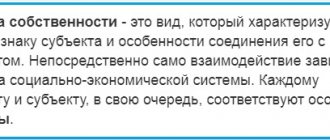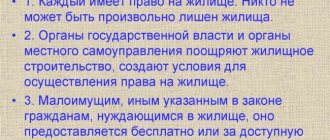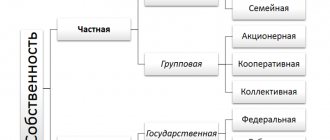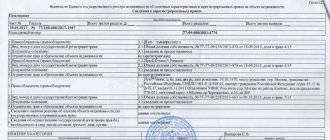Private property rights
print version
Article 35 of the Constitution of the Russian Federation proclaims:
"1. The right of private property is protected by law.
2. Everyone has the right to own property, own, use and dispose of it, both individually and jointly with other persons.
3. No one can be deprived of his property except by a court decision. Forced alienation of property for state needs can only be carried out subject to prior and equivalent compensation.
4. The right of inheritance is guaranteed.”
In accordance with the Constitution of the Russian Federation, private, state, municipal and other forms of property are equally recognized and protected in the Russian Federation. The right of private property is one of the forms of ownership, meaning the absolute, legally protected right of the owner to exercise the rights of the owner in relation to specific property, including the means of production.
The concept of “private property” was absent in Soviet legislation. Property on the right of private ownership can belong to both a citizen of the Russian Federation and foreign citizens and stateless persons, on an equal basis with citizens of the Russian Federation, except in cases established by federal laws or an international treaty of the Russian Federation (Part 3 of Article 62 of the Constitution of the Russian Federation). For example, an agreement between states may prohibit citizens of the agreed countries from acquiring land, industries or other real estate on the territory of these states.
Any property can be privately owned, but it should be taken into account that:
citizens can own any objects, with the exception of those prohibited for circulation on the territory of the state (for example, a nuclear power plant, a space object, subsoil cannot belong to a citizen);
the quantity and quality of objects that citizens may own are not limited, except in cases specified in the law (for example, the laws of the constituent entities of the Russian Federation limit the area of agricultural land that can belong to one citizen);
restrictions on the quantity and quality of objects that may be owned by citizens are permitted only in the interests of protecting the constitutional system, defense of the country, morality, health and interests of other persons;
transactions of citizens with real estate are subject to state registration (otherwise the right of ownership does not arise), and the real estate itself is subject to an annual tax;
vehicles and weapons belonging to citizens are subject to special registration;
To purchase some objects, citizens are required to obtain a special permit (this applies, for example, to the purchase of firearms, potent poisons, etc.);
citizens keeping livestock must comply with veterinary and sanitary rules;
citizens who own a plot of land are obliged to take care of the fertility of the land;
the rules by which citizens receive dividends from securities are determined by law and the constituent documents of organizations.
In accordance with Article 238 of the Civil Code of the Russian Federation, if, on grounds permitted by law, a person owns property that by force of law cannot belong to him, this property must be alienated by the owner within a year from the moment the ownership right arises, unless established by law another deadline. If this obligation is not fulfilled, such property, by a court decision, is subject to forced sale or transfer to state or municipal ownership. If, on grounds permitted by law, a citizen owns an item for the acquisition of which a special permit is required, but its issuance to the owner is refused, this item is subject to alienation in the same manner. Property that cannot be owned by a citizen at all, because its circulation is prohibited (for example, radioactive metals, drugs, weapons, etc.), but what is found on a citizen is subject to seizure by authorized bodies and is the basis for initiating appropriate criminal cases.
The right of private property is absolute, i.e. a citizen has the right to own, use and dispose of property at his own discretion and in his own interest (for example, alienate his property into the ownership of other persons, transfer to them, while remaining the owner, the rights to own, use and dispose of property, donate, pledge property, etc.) . However, in this case, a citizen should not go beyond the general limits established by civil law. In particular, actions of citizens carried out solely with the intention of causing harm to another person, as well as abuse of rights in other forms, are not allowed. The use of civil rights to restrict competition, as well as the abuse of a dominant position in the market, is not allowed.
The article in question of the Constitution of the Russian Federation guarantees the inviolability of the right to private property. No one can be deprived of his property except by a court decision (for example, by a court verdict, the property of the guilty person is confiscated). Forced alienation of property for state (municipal) needs can be carried out only subject to preliminary and equivalent compensation. Alienation of property from a private owner without compensation for the cost is generally unacceptable. In this case, the issue of the specific value of property alienated for state (municipal) needs is resolved by agreement between the owner and a representative of the state (municipality). The dispute regarding the value of the alienated property is considered in court.
The Constitution of the Russian Federation guarantees that the owner has the right to bequeath property belonging to him to any person - a citizen of the Russian Federation or a foreigner, a stateless person, an organization, as well as the state.
In the absence of a will, inheritance of property is carried out in the order of priority determined by Part 3 of the Civil Code of the Russian Federation. Date of publication: 04/19/2013 Date of modification: 12/14/2016
In some countries, foreign citizens are not allowed to purchase land. How are things going in the Russian Federation? Foreign citizens can own real estate, however, the laws here provide for several exceptions, more on that.....
The Russian Constitution establishes that land is public property (Article 9). From the provisions of Art. 35 of the Constitution of the Russian Federation it follows that the subject of the constitutional right of private property can be anyone - both an individual (citizen, foreign citizen, stateless person) and a legal entity (commercial or non-profit organization, foreign organization) located on the territory of the state. In relation to the right of ownership of land, the Constitution of the Russian Federation in Part 1 of Art. 36 specifies that the subjects of this right include citizens of the Russian Federation and their associations. At the same time, the Land Code of the Russian Federation establishes restrictions on the ownership of land plots for foreign citizens. For example, foreigners are not granted ownership of plots of land in sanatorium and resort areas, where natural areas are under special protection. Foreigners in our country cannot own agricultural land. They can own such plots only on a leasehold basis. If the share of foreign capital in a company's authorized capital is more than fifty percent, then the lands intended for agricultural work are not provided to such a company. Foreigners are also not granted ownership of mineral resources, forests, and the continental shelf. These objects can only be provided to a foreigner for rent, and then only on condition that he has the appropriate license. From the above examples it is clear that the main type of land ownership in our country for a foreigner is renting a plot of land. But a foreigner can acquire ownership of a plot of land in Russia by inheritance or on other legal grounds. So, let's return to the legislation of the Russian Federation. Realizing its constitutional obligation, the federal legislator introduced some restrictions for foreign citizens, stateless persons and foreign legal entities in the exercise of land use rights, thereby establishing exceptions from the national regime for regulating the right of private ownership of land. Thus, paragraph 3 of Article 15 of the Land Code of the Russian Federation introduced a ban on the ownership of land plots located on the border and other territories of the Russian Federation for these persons. Decree of the President of the Russian Federation dated January 9, 2011 No. 26 (current version dated April 11, 2021) approved the list of border territories in which foreign citizens, stateless persons and foreign legal entities cannot own land plots. In the Krasnodar Territory, such territories include: Municipal entity Yeisk district, Municipal entity Kanevsky district, Municipal entity Mostovsky district, Municipal entity Primorsko-Akhtarsky district, Municipal entity Slavyansky district, Municipal entity Temryuk district, Municipal entity Tuapse district, · Municipal formation of Shcherbinovsky district, · Municipal formation of the city of Anapa, · Municipal formation of the resort city of Gelendzhik, · Municipal formation of the resort city of Novorossiysk, · Municipal formation of the resort city of Sochi. In connection with the publication of the Decree, the ban established by the Land Code of the Russian Federation on the ownership of land plots located in border areas by foreign citizens, stateless persons and foreign legal entities came into force. From the moment the Decree comes into force, that is, from January 9, 2011, these persons cannot possess such plots of land, regardless of the basis on which this right arises, that is, they can neither privatize such land plots nor acquire them ownership in any other way. The decree approved a specific list of territories to which the ban applies - this is the territory of 379 municipalities/districts/districts (plus the Kronstadt district of St. Petersburg). In particular, the list includes cities located in one way or another in certain proximity to the state border of the Russian Federation. This norm is mandatory, that is, the application of Part 3 of Article 15 of the Land Code of the Russian Federation is mandatory and cannot be circumvented in any way. So, the Law prohibits foreign citizens, stateless persons, as well as foreign legal entities from acquiring land in the border territories of the Russian Federation. However, consider the following situation..., before the Decree came into force, the current legislation allowed foreigners to acquire ownership of land plots in border areas from private owners on the basis of any transactions with the exception of privatization. It is not surprising that at the time the Decree came into force, a certain number of foreign owners of land plots appeared in the border areas. In order to analyze the possible fate of a land plot located in border areas and owned by a foreign citizen or a foreign legal entity, it is necessary to answer the question on what basis this land plot was acquired. Possible consequences for “illegal” owners. The ban on the privatization of state-owned land plots in border areas by foreign citizens and legal entities was in effect even before the Decree came into force. Consequently, there is a possibility that the person who acquired ownership of such a land plot through privatization did so in violation of the current legislation, which means there are grounds to classify such a transaction as invalid. According to the rules of the Civil Code of the Russian Federation, each party to an invalid transaction is obliged to return to the other party everything received under the transaction, and if it is impossible to return what was received in kind, to reimburse its value in money (taking into account the applicable statute of limitations). Thus, foreign citizens, stateless persons and foreign legal entities who illegally acquired land plots in border territories through privatization are clearly at risk, since they may lose these plots as a result of the application of the consequences of invalidity to the transactions they have concluded. Possible consequences for legal owners. Another group consists of foreign citizens, stateless persons and foreign legal entities who acquired land plots in border territories before the Decree came into force on the basis of a purchase and sale transaction from a private owner, by inheritance or on other legal grounds. Neither the Land Code nor the Decree contain special rules establishing the fate of land plots located in border territories that were legally acquired in one way or another by foreign citizens, stateless persons or foreign legal entities before the Decree came into force. On the one hand, the rights of these persons to the land plots they acquired must be protected by the general rule of law that the law does not have retroactive effect. However, we must not forget about the rules contained in the Civil Code of the Russian Federation in relation to property limited in circulation, since due to the restrictions established by the Land Code, land plots located in border territories can be qualified as such property. According to Art. 238 of the Civil Code, if a person has this kind of property legally, but this person is legally deprived of the opportunity to possess it by right of ownership, such property must be alienated by the owner within a year from the moment the right of ownership to the property arises, unless otherwise established by law term. In cases where the property is not alienated by the owner in a timely manner, such property, taking into account its nature and purpose, by a court decision made at the request of a state body or local government body, is subject to forced sale with the transfer of the proceeds to the former owner or transfer to a state or municipal property with compensation to the former owner for the value of the property determined by the court. In this case, the costs of alienation of property are deducted (clause 2 of the said article of the Code). Possibility of applying Art. 238 of the Civil Code of the Russian Federation raises many questions about the situation under consideration, since the one-year period specified in it may not be relevant (after all, at the time the Decree entered into force, the land plot could have been legally owned by such a foreign person for more than a year). However, the fact that this norm exists in the current legislation of the Russian Federation does not currently allow us to draw an unambiguous conclusion that the rights of foreign citizens, stateless persons and foreign legal entities that have legally acquired land plots in border areas will not be affected in any way due to the adoption of the Decree . The ambiguity of the current situation can probably be resolved either by the formation of judicial practice, or by the adoption by the legislator of special normative legal acts regulating the future fate of land plots in border territories that are owned by foreign citizens or legal entities, or by the adoption by authorized authorities of official clarifications regarding the application to this situation of the current legislation of the Russian Federation. Arbitrage practice . Courts generally correctly apply the norms of substantive law, in particular, the provisions of Articles 3, 5 of the Law on the Turnover of Agricultural Land, paragraph 3 of Article 15 of the Land Code of the Russian Federation. In cases of this category, judges checked whether the citizenship of the defendant had changed, whether by the time the case was considered, he had not completed a transaction to alienate a land share or land plot and, accordingly, whether he still had the obligation to sell the land plot. For example, by the decision of the Oktyabrsky District Court of Novorossiysk dated February 11, 2021 (case No.) on the claim of the prosecutor of the city of Novorossiysk, citizen Aglinishkis V.V. forced to sell his shares in the right of common ownership of a land plot of agricultural land with cadastral number No., located at the address: .... In making this decision, the court correctly proceeded from the fact that the defendant Aglinishkis V.V. is a citizen of a foreign state, his ownership of the disputed land shares was registered on March 29, 2005 and April 15, 2005, and within a year from the date of state registration of the right, the defendant did not alienate the land shares. At the same time, it should be noted that when making a decision at the request of a government body of a constituent entity of the Russian Federation to force the owner to sell a land plot or a share in the right of common ownership of a land plot of agricultural land, the operative part must indicate the sale of such land plot. at auctions (competitions, auctions), since this is the procedure established by Article 5 of the Law on the Turnover of Agricultural Land. For foreign citizens and organizations, there are still restrictions on the exercise of land use rights in relation to land plots located on the border territories of the Russian Federation, the list of which is established by the President of the Russian Federation in accordance with the federal legislation on the State Border of the Russian Federation and in the case where the property is not alienated by the owner, such property subject to forced sale with the transfer of the proceeds to the former owner or transfer to state or municipal ownership with compensation to the former owner for the value of the property determined by the court.






